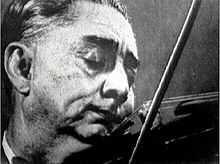Grigoraș Dinicu

Grigoraş Ionică Dinicu (Romanian: [ɡriɡoˈraʃ i.oˈnikə diˈniku]; April 3, 1889 – March 28, 1949 [or August 5, 1948])[1] was a Romanian composer and violinist or violin virtuoso. He is most famous for his often-played virtuoso violin showpiece "Hora staccato" (1906) and for making popular the tune Ciocârlia, composed by his grandfather Angheluș Dinicu[2][3] for "nai" (the Romanian pan flute). It is rumored that Jascha Heifetz once said that Grigoraş Dinicu was the greatest violinist he had ever heard. In the 1930s he was involved in the political movement of the Romanian Roma and was made honorary president of the "General Union of the Romanian Roma".[4]
Early life and education
He was born in Bucharest, in the neighborhood of the lăutari. Because his father was busy with his activity as a lăutar, he handled him to "moş Zamfir", an old violinist, who taught him the first songs. He attended the Bucharest Conservatory, where he studied with Kiriac-Georgescu. The most famous of his teachers was Carl Flesch, the violin pedagogue, with whom he studied in 1902. He received a scholarship at the Vienna Conservatory, but he was not allowed to go there because he was Romani, an episode that he never forgot.
Career
After graduation he played violin with the Orchestra of the Ministry of Public Instruction, and also performed as a soloist. Hora staccato dates from the beginning of this period; he wrote it as a graduation exercise. For forty years, from 1906 until 1946, he directed popular music concerts. He also toured abroad as a soloist and conductor, and he also played a great deal of light music in nightclubs, hotels, restaurants, and cafés in Bucharest and throughout Western Europe.
His music is mostly for violin and piano, though some pieces (such as Hora staccato) have later been arranged for other combinations of instruments (for example, trumpet and piano, as well as violin and orchestra and a popular arrangement by Russian mandolin virtuoso Dave Apollon). Other works of Dinicu's, all in a light, in classical or lăutareasc style, include Hora spiccato, Hora de concert, Hora mărţişorului (Mărţişor, literally "little March", is a major Romanian seasonal holiday on March 1), Hora de la Chiţorani ("Hora from Chiţorani", a town in Prahova county), Hora Expoziţiei de la Paris ("Hora of the Paris Exposition"), Improvisation à la Dinicu ("Improvisation in the style of Dinicu"), Orientale à la tzigane ("Orientale in Gypsy style"), and Sârba lui Tanţi ("Tanţi's sârba"; a sârba is another type of Romanian dance).
He died in Bucharest of laryngeal cancer.
Miscellanea
The jazz manouche violinist Stéphane Grappelli was a great admirer of Dinicu and of the way that the violin was played in the lăutarească music.[5]
References
- ↑ Gheorghe Ciobanu: Biography and music critique for the disc record Recital Grigoraș Dinicu. Electrecord, Bukarest (about) 1960.
- ↑ Romanian folkloric tunes known abroad
- ↑ Interview with Grigore Leşe
- ↑ Istoria romilor
- ↑ Interview with Florin Niculescu
Further reading
- Andrew Lamb: "Grigoraş Dinicu", Grove Music Online ed. L. Macy (Accessed November 13, 2005), (subscription access)
- The Concise Edition of Baker's Biographical Dictionary of Musicians, 8th ed. Revised by Nicolas Slonimsky. New York, Schirmer Books, 1993. ISBN 0-02-872416-X
- Cosma, Viorel: "Lăutari de ieri şi de azi", ed. Du Style, 1996. ISBN 973-9246-05-2
External links
-
 Media related to Grigoraș Dinicu at Wikimedia Commons
Media related to Grigoraș Dinicu at Wikimedia Commons
|